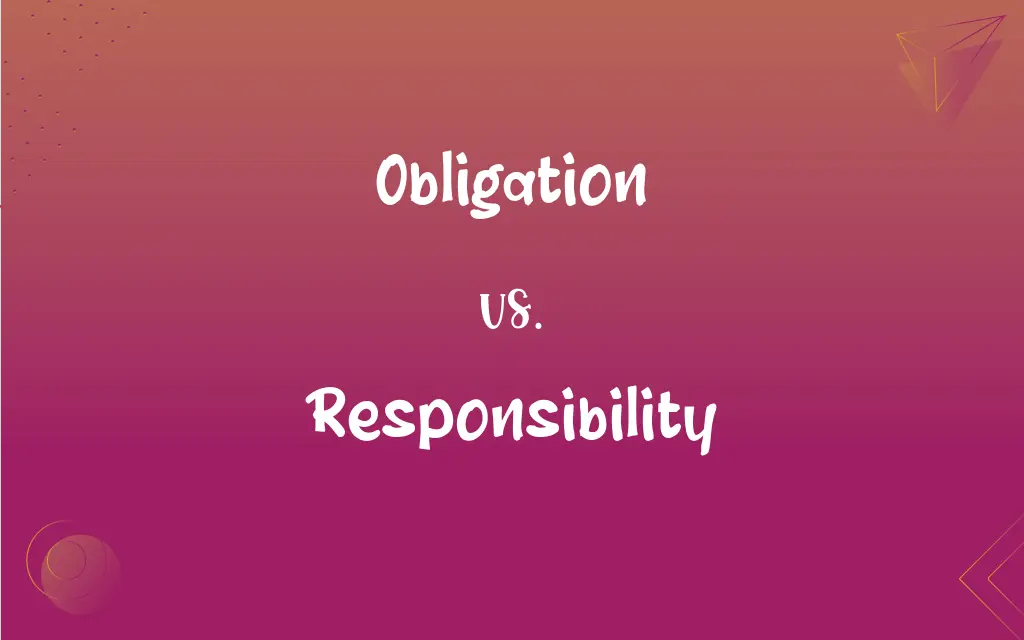Obligation vs. Responsibility: What's the Difference?
Edited by Aimie Carlson || By Janet White || Updated on October 30, 2023
Obligation refers to a duty or commitment one is bound to fulfill, whereas responsibility denotes an accountable role or duty that one holds.

Key Differences
An obligation often arises from external sources, like laws or contracts, making it a duty one must fulfill. On the other hand, responsibility can be innate or chosen, stemming from one's role or position.
While an obligation may have clear consequences for non-compliance, a responsibility might not always have explicit repercussions, but could lead to moral or ethical dilemmas.
Obligations can sometimes be transferred or delegated, like in contractual agreements. Responsibilities, especially those related to roles or positions, are often personal and harder to delegate.
Every obligation doesn't necessarily mean responsibility, but every responsibility typically comes with certain obligations.
One might feel an obligation due to societal or peer pressures, whereas responsibility often comes with accountability and the expectation to act in a certain way.
ADVERTISEMENT
Comparison Chart
Source
Often external, like laws or contracts
Typically innate or from roles/positions
Transferability
Can sometimes be delegated or transferred
Harder to delegate; often personal
Consequences
Clear consequences for non-compliance
Not always explicit repercussions
Relation to Accountability
Might not entail accountability
Often entails accountability
Nature
Bound duty or commitment
Accountable role or duty
ADVERTISEMENT
Obligation and Responsibility Definitions
Obligation
It's a cultural obligation to respect elders.
A condition tied to an agreement.
Responsibility
A task or duty one is expected to perform.
Parents have the responsibility to care for their children.
Obligation
There's an obligation to pay rent on the first of every month.
A requirement set by laws.
Responsibility
The obligation to act ethically.
Corporations have a responsibility toward environmental sustainability.
Obligation
He had an obligation to help those less fortunate.
Responsibility
The state of being accountable
As a manager, it's her responsibility to guide her team.
Obligation
Mily event.
Commitment arising from societal norms.
Responsibility
Holding oneself to a standard.
With freedom comes great responsibility.
Obligation
A duty bound by external factors.
She felt an obligation to attend the fa
Responsibility
Duty associated with a role.
The captain has the responsibility to lead the team.
Obligation
Citizens have an obligation to pay taxes.
A moral imperative felt personally.
Responsibility
The state, quality, or fact of being responsible.
Obligation
A social, legal, or moral requirement, such as a duty, contract, or promise, that compels one to follow or avoid a particular course of action
Are you able to meet your obligations? I have an obligation to attend their wedding.
Responsibility
A duty or obligation that one is responsible for.
Obligation
The constraining power of a promise, contract, law, or sense of duty
I felt no obligation to offer my advice.
Responsibility
An expense, debt, or financial burden that one must pay.
Obligation
(Law) A document in which a person binds himself or herself to undertake or refrain from doing a particular act.
Responsibility
The amount of such expense, debt, or financial burden.
Obligation
A debt instrument, such as a loan, mortgage, or bond.
Responsibility
The state of being responsible, accountable, or answerable. 18
Responsibility is a heavy burden.
Obligation
The state, fact, or feeling of being indebted to another for a special service or favor received
If they invite us, aren't we under obligation to invite them in return?.
Responsibility
The state of being liable, culpable, or responsible for something in particular.
Obligation
The act of binding oneself by a social, legal, or moral tie to someone.
Responsibility
A duty, obligation or liability for which someone is held accountable.
Why didn't you clean the house? That was your responsibility!
Obligation
A social, legal, or moral requirement, duty, contract, or promise that compels someone to follow or avoid a particular course of action.
I feel I'm under obligation to attend my sister's wedding, even though we have a very frosty relationship.
Responsibility
(military) The obligation to carry forward an assigned task to a successful conclusion. With responsibility goes authority to direct and take the necessary action to ensure success.
Obligation
A course of action imposed by society, law, or conscience by which someone is bound or restricted.
Responsibility
(military) The obligation for the proper custody, care, and safekeeping of property or funds entrusted to the possession or supervision of an individual.
Obligation
(legal) A legal agreement stipulating a specified action or forbearance by a party to the agreement; the document containing such agreement.
Responsibility
The state of being responsible, accountable, or answerable, as for a trust, debt, or obligation.
Obligation
The fact of being obliged to, that is, grateful for, something.
Responsibility
That for which anyone is responsible or accountable; as, the resonsibilities of power.
Obligation
The act of obligating.
Responsibility
Ability to answer in payment; means of paying.
Obligation
That which obligates or constrains; the binding power of a promise, contract, oath, or vow, or of law; that which constitutes legal or moral duty.
A tender conscience is a stronger obligation than a proson.
Responsibility
The social force that binds you to your obligations and the courses of action demanded by that force;
We must instill a sense of duty in our children
Every right implies a responsibility; every opportunity, an obligation; every possession, a duty
Obligation
Any act by which a person becomes bound to do something to or for another, or to forbear something; external duties imposed by law, promise, or contract, by the relations of society, or by courtesy, kindness, etc.
Every man has obligations which belong to his station. Duties extend beyond obligation, and direct the affections, desires, and intentions, as well as the actions.
Responsibility
The proper sphere or extent of your activities;
It was his province to take care of himself
Obligation
The state of being obligated or bound; the state of being indebted for an act of favor or kindness; - often used with under to indicate being in that state; as, to place others under obligations to one.
Responsibility
A form of trustworthiness; the trait of being answerable to someone for something or being responsible for one's conduct;
He holds a position of great responsibility
Obligation
A bond with a condition annexed, and a penalty for nonfulfillment. In a larger sense, it is an acknowledgment of a duty to pay a certain sum or do a certain things.
Obligation
The social force that binds you to your obligations and the courses of action demanded by that force;
We must instill a sense of duty in our children
Every right implies a responsibility; every opportunity, an obligation; every possession, a duty
Obligation
The state of being obligated to do or pay something;
He is under an obligation to finish the job
Obligation
A personal relation in which one is indebted for a service or favor
Obligation
A legal agreement specifying a payment or action and the penalty for failure to comply
FAQs
Can obligations arise from societal pressures?
Yes, obligations can arise from societal norms or expectations.
Can an obligation be transferred?
Some obligations, especially those in contracts, can be transferred or delegated.
How does responsibility differ from obligation?
Responsibility denotes an accountable role or duty, while obligation is a duty or commitment to act.
Are all responsibilities tied to accountability?
Typically, responsibility comes with accountability or the expectation to act appropriately.
Can one have responsibilities without obligations?
Often, responsibilities come with certain obligations, but one can hold responsibility without specific external obligations.
Are obligations always legal in nature?
No, while some obligations arise from laws, others can be moral, societal, or contractual.
What is an obligation?
An obligation refers to a duty or commitment one is bound to fulfill.
What's the moral aspect of responsibility?
Responsibility often entails upholding certain moral or ethical standards and acting in a manner aligned with them.
Are obligations always explicit?
While many obligations are explicit, some, especially those tied to societal norms, might be implicit.
Can one delegate their responsibilities?
Some responsibilities can be delegated, but many, especially personal ones, are harder to pass on.
Why are responsibilities often linked to roles?
Roles often come with expectations and duties, leading to associated responsibilities.
Can one opt out of their obligations?
Some obligations can be negotiated or changed, but others, especially legal ones, are mandatory.
Is taking responsibility the same as admitting fault?
Not always. Taking responsibility means acknowledging one's role, which doesn't always mean admitting fault or wrongdoing.
Is responsibility always self-imposed?
No, responsibilities can be both self-imposed and assigned based on roles or positions.
Can responsibilities change over time?
Yes, as roles, situations, or contexts change, responsibilities can evolve.
Why is it important to understand one's responsibilities?
Understanding responsibilities ensures clarity in roles, expectations, and can guide ethical and effective actions.
Can an obligation be a moral duty?
Yes, obligations can arise from personal moral beliefs or societal moral standards.
What happens when obligations conflict with personal responsibilities?
It can lead to dilemmas, and individuals often have to prioritize based on values, consequences, and context.
Why might someone feel a strong sense of obligation?
This can stem from personal values, societal expectations, upbringing, or specific commitments made.
Can an individual have multiple obligations at once?
Absolutely, individuals often juggle multiple obligations, whether contractual, legal, moral, or societal.
About Author
Written by
Janet WhiteJanet White has been an esteemed writer and blogger for Difference Wiki. Holding a Master's degree in Science and Medical Journalism from the prestigious Boston University, she has consistently demonstrated her expertise and passion for her field. When she's not immersed in her work, Janet relishes her time exercising, delving into a good book, and cherishing moments with friends and family.
Edited by
Aimie CarlsonAimie Carlson, holding a master's degree in English literature, is a fervent English language enthusiast. She lends her writing talents to Difference Wiki, a prominent website that specializes in comparisons, offering readers insightful analyses that both captivate and inform.































































